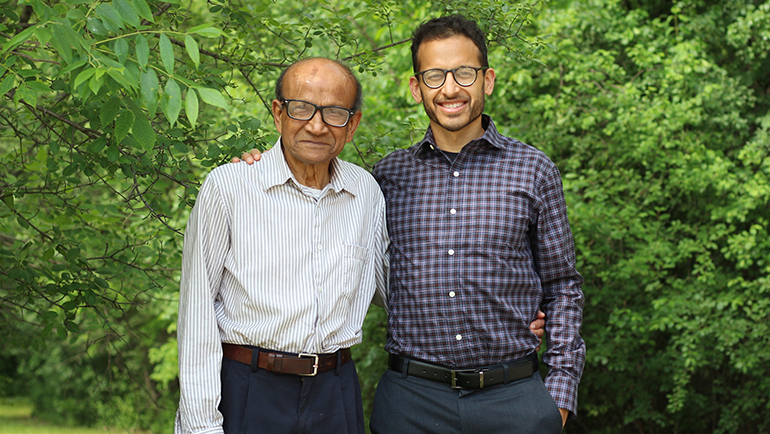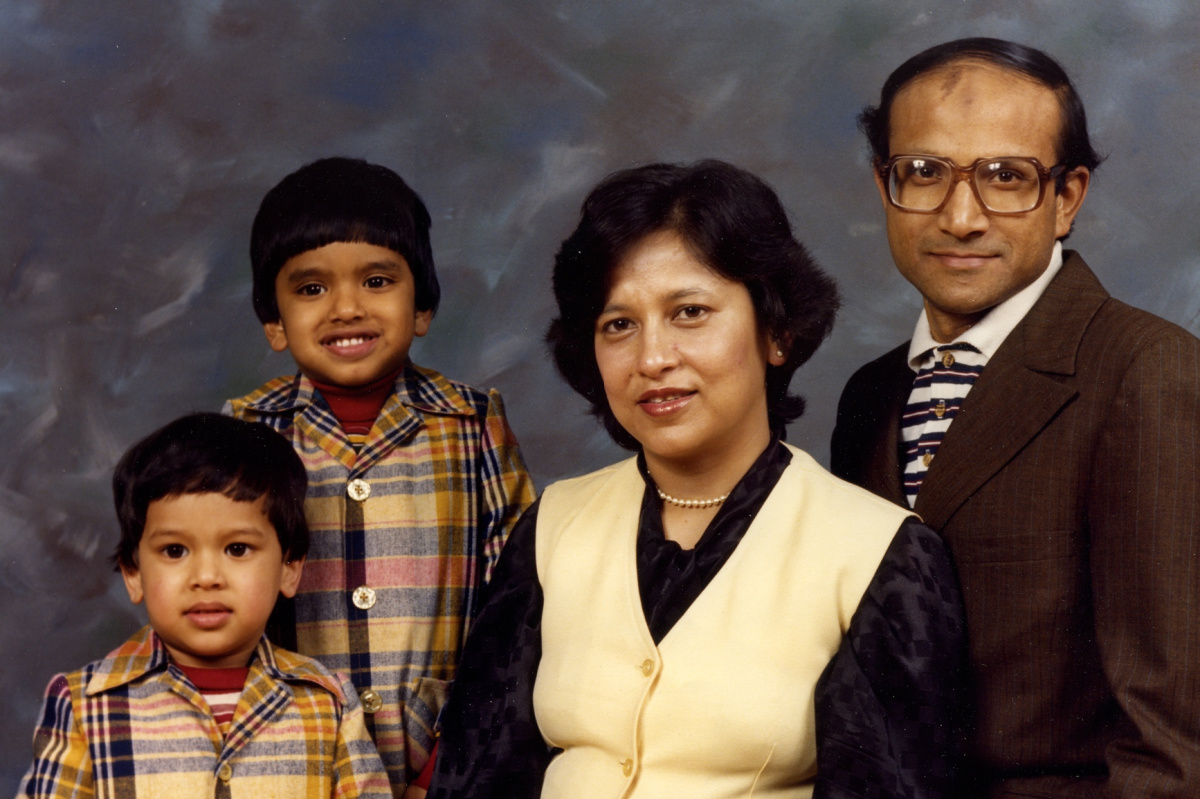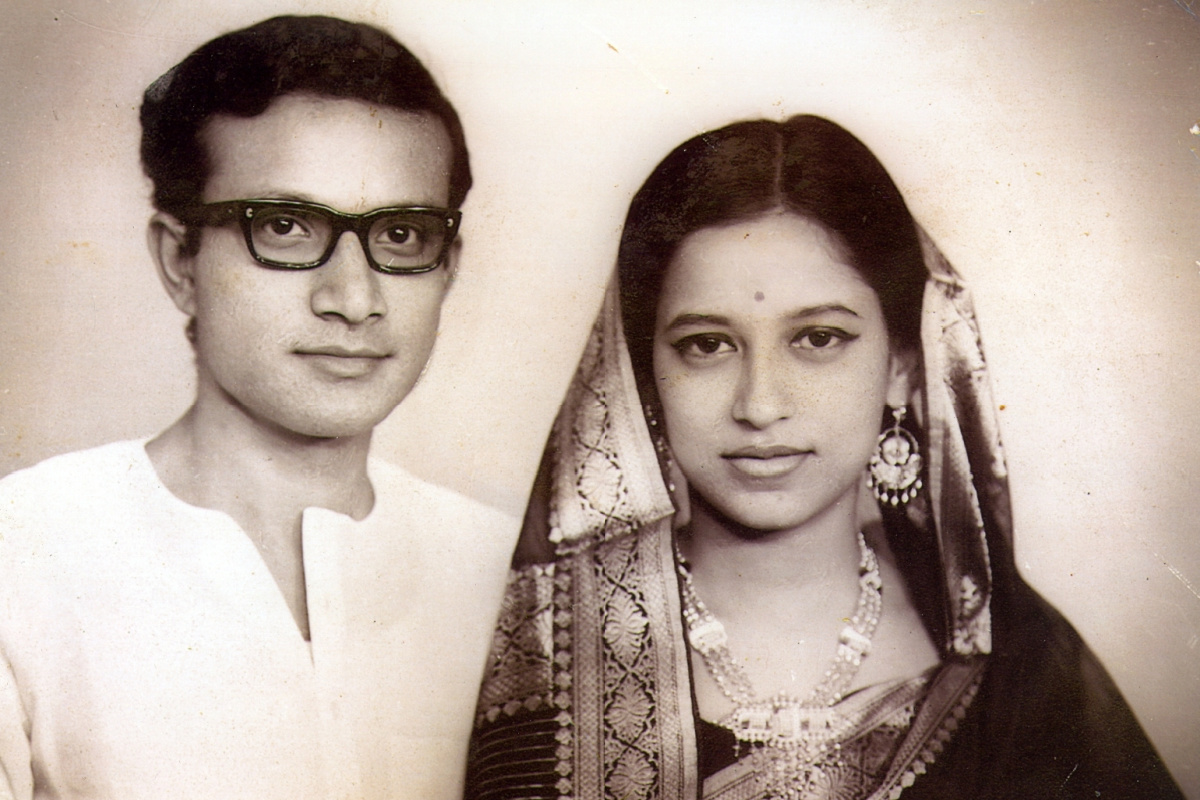
This is a story about an Indian man who emigrated to the United States at 29 to provide a better life for his family. It’s a story about how community bonds strengthen families. It’s a story about Wayne State University and the city of Detroit. Most importantly, it’s the story of a father and his son, the sacrifices they made for each other and the love they share.
Born in Bankura, West Bengal, in October 1942, five years before India gained its independence from British rule, Satyendra Basu attended school and preliminary college in Bengal, graduating from Bengal Engineering College in 1964 with a degree in electrical engineering.
“I came to Michigan in Jan. 1971, although I originally planned to emigrate to Washington, D.C. because that was really the only American city I had heard of,” said Basu, known to his friends as Sat. “My brother-in-law was a student at Wayne State in 1969 and he told me a lot about Detroit, so I changed my mind about where I wanted to settle.”
Sat met his future wife Indira in 1966 and they got married in 1970. Their son Avik came along in 1977, followed by his brother Amar in 1978. As the family lived in Troy at the time, both boys were born in what was then known as Crittenton Hospital, now Ascension Providence Hospital.

Soon after moving to Detroit, Sat began working for Detroit Edison (now DTE Energy), making five dollars an hour as an assistant engineer, designing electrical lines and systems for power delivery. He spent 35 years there before retiring in 2006.
Amar remembers occasional visits to his dad’s office when he was very young.
“It was fun to take the elevators in a tall office building, seeing the never-ending cubicles, and stacks of papers on his desk with lots of numbers on them,” Amar said. “As young kids, we really had no idea what engineering was all about. But I do remember being mesmerized the day he took us to see the control room at Detroit Edison; it was like mission control at NASA. I also remember my brother and I being excited when Baba (the Bengali word for father) returned home every day after work. He made it a point to teach us and expose us to science, sports, music, and as many experiences as he could find.”
Before his sons came along, Sat and Indira lived in a small house at the corner of Second and Forest Avenue in midtown Detroit. By this time Sat was earning his master’s degree at Wayne State at night and working at Detroit Edison all day. He would walk to school and to his job. “I enjoyed the walks in the summer. Not so much in the winter.”
Sat received his master’s degree from Wayne State in 1974, 10 years after he earned his bachelor’s degree back in India.
Amar may have had only a vague notion about what his dad did for a living, but over time it certainly influenced his plans. Sat had wisely invested in the Michigan Education Trust to help pay for his sons’ educations. There was one caveat: They must choose a university in Michigan. But that edict changed over time. “I told my sons if they couldn’t find a university in Michigan that they liked, of course they could look out of state.”

Both of Sat’s sons went to the University of Michigan Ann Arbor. There, Amar began his journey following in his father’s footsteps.
“I made the decision to study electrical engineering because I enjoyed physics and math more than biology and chemistry. It goes without saying, I was unmistakably influenced by my father and brother.” It cost all of $5,000 to send Amar through college back then.
When it was time for Amar to find a job after completing his Ph.D., he naturally gravitated toward staying in Michigan where his family lived. He received a plum invitation to work at a national lab in California and gave that offer its due weight. But the pull of family was stronger. Soon, the place where his father earned his master’s degree came calling.
“It was a surprisingly tough decision to take the job at Wayne State because I saw this decision as a pivotal point in my life, a major turning point,” Amar said. “Sensing that I was struggling with this decision, Baba took me on a long walk on campus one afternoon. He pointed out buildings along Cass Avenue that he had spent time in, and their old apartment on Second Avenue. Wayne State felt like home.” Amar was also impressed that Wayne State had a microfabrication facility, a rare commodity for engineering schools during those days. So he accepted Wayne State’s offer to join the university as faculty of electrical engineering.
“Staying in Michigan near family was definitely a key consideration for me as I mulled my decision,” Amar said. “Baba and Ma made a lot of friends during their time living in Detroit, families we would spend evenings and vacations with. Many years later, that close-knit community, along with some wonderful friends I made in school, and most of all my wife Sonal, have made Michigan a great home for me.”
Today, Amar works in the same building that his father attended classes in during the early 1970s. “I work on the third floor of the engineering building in the same set of offices that my dad visited his professors. I often meet students from India who faced the same struggles and victories that he did. There’s a certain poetic symmetry in that.”
Amar said that his father is very modest about his role in building a strong Bengali community in Detroit. “It has been his life mission. For decades he’s volunteered in the Bengali community, helping his fellow country men and women establish a life here, and making sure their families are taken care of. Almost 40 years ago he starting teaching the Bengali language to kids every Friday night (including me and my brother) and he still continues that to this day.”
Sat said that was one of his goals all along: to build a strong community of people from Bengal and other Indian states. “One thing I realized when I came over to America was I had to have friends. I was lucky that at work and school I met people from all over the world, people who have been friends for a long time. That made life easy and more fulfilling for me and my family.”
“Wayne State has had a very different meaning for me over the last 15 years,” Amar said. “This university gave Baba a life in the states and then gave me a life, too. It holds a special place in my heart. Because Baba had the strength and courage to move to the other side of the globe, we’ve had all the opportunities of life in the US, while enjoying the rich experience of a Bengali heritage here and in India. We’re blessed with lifelong friendships with people I consider to be brothers and sisters and aunts and uncles; people I never would have come into contact with if it wasn’t for my father’s strong desire to provide his family with a better life.”
